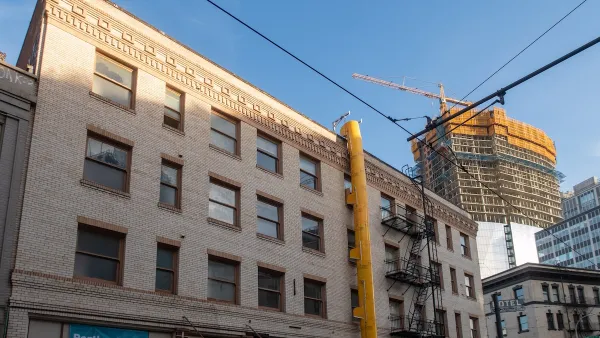The city of Portland is considering an expansion of parking requirements in Northwest Portland, much to the chagrin of advocates who predict the new requirements will make housing more expensive.

Michael Andersen reports on cause and effect in Portland, in a discussion about the effect of parking requirements implemented in 2013. Andersen cites the work of Portland affordability advocate Brian Cefola, who has collected data showing that housing prices fell between 2011 and 2013, while the city was allowing the construction of apartments without parking garages on-site. In fact, "during the 2011-2013 no-parking boom, the average new Portland apartment cost 17 percent less to build than would have been 'expected.' Then it returned to normal," according to Andersen, when the city implemented new parking requirements in 2013.
The problem, Andersen also checked with experts like Joe Cortright of City Observatory and found that the data provides only circumstantial evidence. Cefola doesn't disagree with that assessment, according to the article, but he does insist that circumstantial evidence is "enough reason for professionals at the city to dig deeper."
These questions are especially relevant in light of ongoing consideration of legislation that would expand parking requirements in Northwest Portland. Rachel Monahan provides coverage of that issue for the Willamette Week.
FULL STORY: Average apartment building costs fell sharply during no-parking apartment boom

Planetizen Federal Action Tracker
A weekly monitor of how Trump’s orders and actions are impacting planners and planning in America.

Chicago’s Ghost Rails
Just beneath the surface of the modern city lie the remnants of its expansive early 20th-century streetcar system.

San Antonio and Austin are Fusing Into one Massive Megaregion
The region spanning the two central Texas cities is growing fast, posing challenges for local infrastructure and water supplies.

Since Zion's Shuttles Went Electric “The Smog is Gone”
Visitors to Zion National Park can enjoy the canyon via the nation’s first fully electric park shuttle system.

Trump Distributing DOT Safety Funds at 1/10 Rate of Biden
Funds for Safe Streets and other transportation safety and equity programs are being held up by administrative reviews and conflicts with the Trump administration’s priorities.

German Cities Subsidize Taxis for Women Amid Wave of Violence
Free or low-cost taxi rides can help women navigate cities more safely, but critics say the programs don't address the root causes of violence against women.
Urban Design for Planners 1: Software Tools
This six-course series explores essential urban design concepts using open source software and equips planners with the tools they need to participate fully in the urban design process.
Planning for Universal Design
Learn the tools for implementing Universal Design in planning regulations.
planning NEXT
Appalachian Highlands Housing Partners
Mpact (founded as Rail~Volution)
City of Camden Redevelopment Agency
City of Astoria
City of Portland
City of Laramie





























